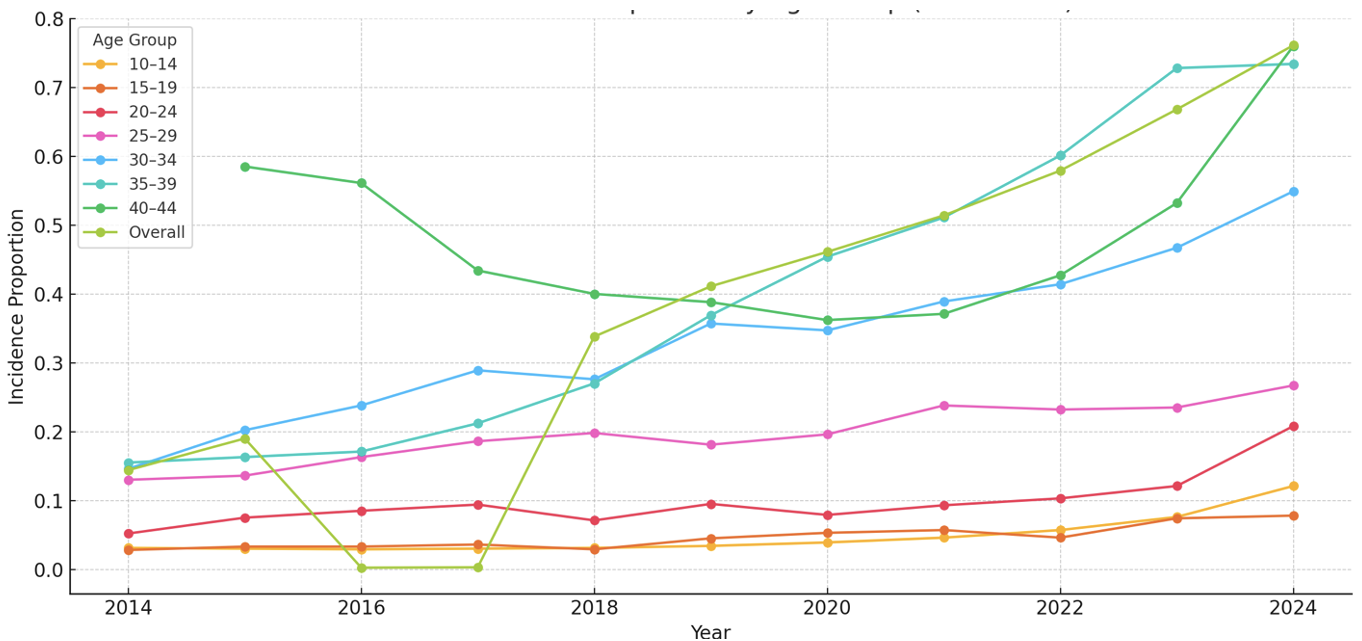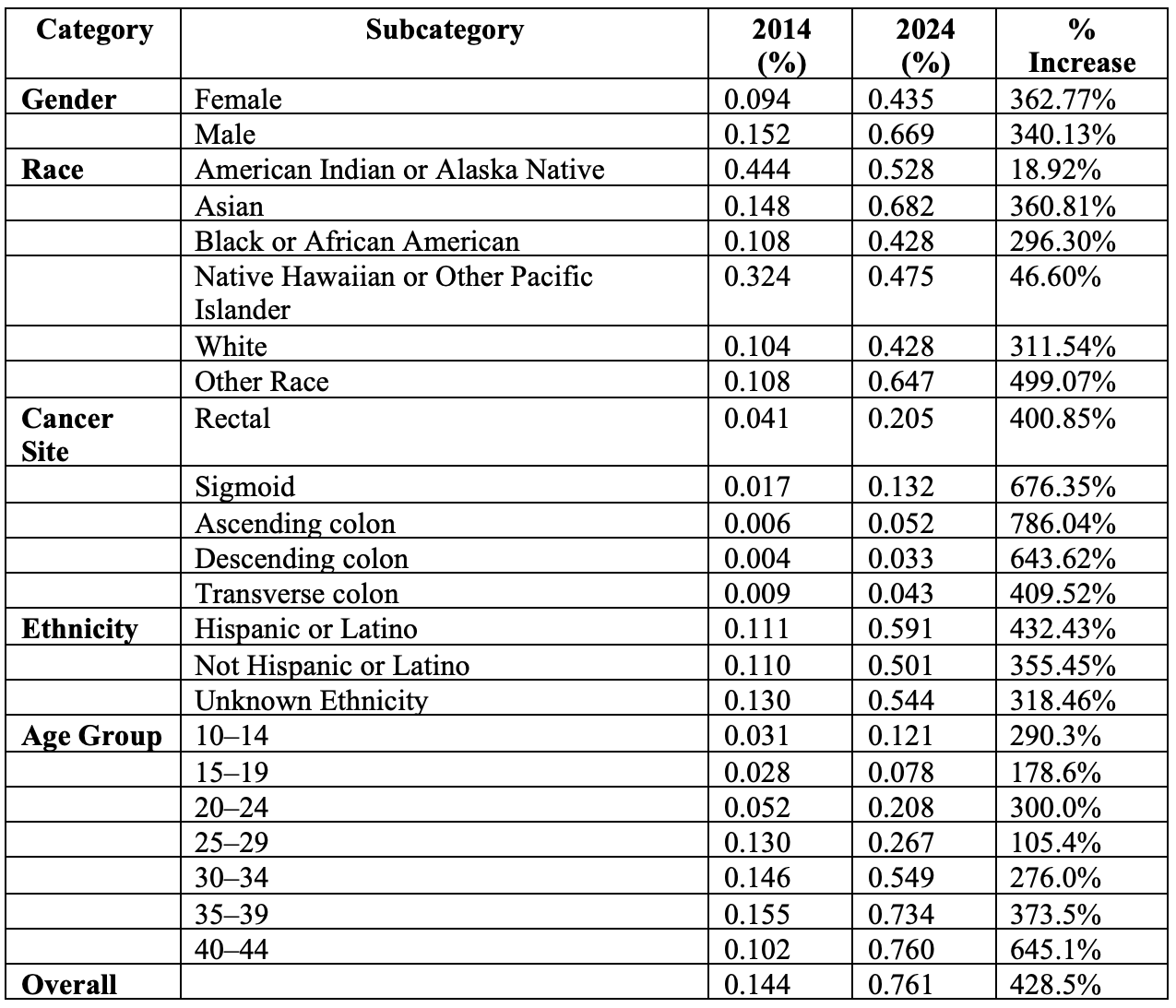Monday Poster Session
Category: Colon
P2401 - Early Onset Colorectal Cancer on the Rise: A Nationwide Alarm From Over 1 Million Cases
Monday, October 27, 2025
10:30 AM - 4:00 PM PDT
Location: Exhibit Hall

Fouad Jaber, MD
Baylor College of Medicine
Houston, TX
Presenting Author(s)
Fouad Jaber, MD1, Mohammad Jaber, MD2, Kinan Obeidat, MD3, Yazan Sallam, MD4, Anas Al-selk, MD5, Khaled Alsabbagh Alchirazi, MD6, Brennan Gioe, MD1, Rawan Dayah, MD1, Milena Gould, MD1
1Baylor College of Medicine, Houston, TX; 2Rawalpindi University, Rawalpindi, Islamabad, Pakistan; 3University of Texas Medical Branch, Santa Fe, TX; 4University of Missouri - Kansas City School of Medicine, Kansas City, MO; 5Tulane University, New Orleans, LA; 6Aurora Health Care, Brookfield, WI
Introduction: Colorectal cancer (CRC) has traditionally been seen as a disease affecting older adults; however, recent data reveal a troubling rise in incidence among younger populations. This has led to increased focus on early-onset CRC in those under 45. Identifying subgroups within this demographic facing the greatest increases is essential to guide screening and prevention.
Methods: We conducted a retrospective cohort study using the TriNetX Research Network, a large, multi-institutional electronic health records database from U.S. healthcare organizations. Patients aged 10 to 44 diagnosed with CRC from 2014 to 2024 were identified using validated ICD codes. Age groups were defined in five-year increments: 10–14, 15–19, 20–24, 25–29, 30–34, 35–39, and 40–44 years. Annual CRC incidence per 100,000 individuals was calculated, and percent changes from 2014 to 2024 reported. Subgroup analyses included incidence by sex, race, ethnicity, and cancer subsite.
Results: Among 1,000,789 individuals aged 10–44 undergoing colonoscopy from 2014 to 2024, CRC incidence increased markedly across age groups (Figure 1). Overall incidence rose from 0.102 to 0.760 per 100,000 individuals, a 428% increase over ten years. The youngest cohort (10–14) saw a 290% rise; ages 15–19 and 20–24 increased by 179% and 300%, respectively. Moderate to sharp rises occurred in the 25–29 (105%), 30–34 (276%), and 35–39 (374%) groups. The largest increase was in the 40–44 cohort, with a 645% rise. Female incidence rose from 0.094% to 0.435% (363%), and male incidence from 0.152% to 0.669% (340%). All racial groups saw increases, largest among Other Race (499%) and Asian (361%), while American Indian or Alaska Native showed a modest 19% rise. Hispanic or Latino ethnicity had the highest increase at 432%, with other ethnicities also rising substantially. By cancer site, ascending colon cancer increased most (786%), followed by sigmoid (676%) and descending colon (644%); rectal and transverse colon cancers rose around 400% (Table 1).
Discussion: Our analysis highlights a concerning, accelerating rise in CRC incidence among those under 45—a group historically at low risk. While absolute incidence remains lower than in older adults, relative increases are dramatic. Incidence has risen across all races, ethnicities, and genders, underscoring the widespread nature of this trend. These findings stress the urgent need for improved clinical awareness and risk stratification to address this public health challenge.

Figure: Figure 1: Trend of colorectal cancer incidence proportion by age group between 2014-2024

Figure: Table 1: Percent changes in demographics and site of colorectal cancer from 2014–2024
Disclosures:
Fouad Jaber indicated no relevant financial relationships.
Mohammad Jaber indicated no relevant financial relationships.
Kinan Obeidat indicated no relevant financial relationships.
Yazan Sallam indicated no relevant financial relationships.
Anas Al-selk indicated no relevant financial relationships.
Khaled Alsabbagh Alchirazi indicated no relevant financial relationships.
Brennan Gioe indicated no relevant financial relationships.
Rawan Dayah indicated no relevant financial relationships.
Milena Gould indicated no relevant financial relationships.
Fouad Jaber, MD1, Mohammad Jaber, MD2, Kinan Obeidat, MD3, Yazan Sallam, MD4, Anas Al-selk, MD5, Khaled Alsabbagh Alchirazi, MD6, Brennan Gioe, MD1, Rawan Dayah, MD1, Milena Gould, MD1. P2401 - Early Onset Colorectal Cancer on the Rise: A Nationwide Alarm From Over 1 Million Cases, ACG 2025 Annual Scientific Meeting Abstracts. Phoenix, AZ: American College of Gastroenterology.
1Baylor College of Medicine, Houston, TX; 2Rawalpindi University, Rawalpindi, Islamabad, Pakistan; 3University of Texas Medical Branch, Santa Fe, TX; 4University of Missouri - Kansas City School of Medicine, Kansas City, MO; 5Tulane University, New Orleans, LA; 6Aurora Health Care, Brookfield, WI
Introduction: Colorectal cancer (CRC) has traditionally been seen as a disease affecting older adults; however, recent data reveal a troubling rise in incidence among younger populations. This has led to increased focus on early-onset CRC in those under 45. Identifying subgroups within this demographic facing the greatest increases is essential to guide screening and prevention.
Methods: We conducted a retrospective cohort study using the TriNetX Research Network, a large, multi-institutional electronic health records database from U.S. healthcare organizations. Patients aged 10 to 44 diagnosed with CRC from 2014 to 2024 were identified using validated ICD codes. Age groups were defined in five-year increments: 10–14, 15–19, 20–24, 25–29, 30–34, 35–39, and 40–44 years. Annual CRC incidence per 100,000 individuals was calculated, and percent changes from 2014 to 2024 reported. Subgroup analyses included incidence by sex, race, ethnicity, and cancer subsite.
Results: Among 1,000,789 individuals aged 10–44 undergoing colonoscopy from 2014 to 2024, CRC incidence increased markedly across age groups (Figure 1). Overall incidence rose from 0.102 to 0.760 per 100,000 individuals, a 428% increase over ten years. The youngest cohort (10–14) saw a 290% rise; ages 15–19 and 20–24 increased by 179% and 300%, respectively. Moderate to sharp rises occurred in the 25–29 (105%), 30–34 (276%), and 35–39 (374%) groups. The largest increase was in the 40–44 cohort, with a 645% rise. Female incidence rose from 0.094% to 0.435% (363%), and male incidence from 0.152% to 0.669% (340%). All racial groups saw increases, largest among Other Race (499%) and Asian (361%), while American Indian or Alaska Native showed a modest 19% rise. Hispanic or Latino ethnicity had the highest increase at 432%, with other ethnicities also rising substantially. By cancer site, ascending colon cancer increased most (786%), followed by sigmoid (676%) and descending colon (644%); rectal and transverse colon cancers rose around 400% (Table 1).
Discussion: Our analysis highlights a concerning, accelerating rise in CRC incidence among those under 45—a group historically at low risk. While absolute incidence remains lower than in older adults, relative increases are dramatic. Incidence has risen across all races, ethnicities, and genders, underscoring the widespread nature of this trend. These findings stress the urgent need for improved clinical awareness and risk stratification to address this public health challenge.

Figure: Figure 1: Trend of colorectal cancer incidence proportion by age group between 2014-2024

Figure: Table 1: Percent changes in demographics and site of colorectal cancer from 2014–2024
Disclosures:
Fouad Jaber indicated no relevant financial relationships.
Mohammad Jaber indicated no relevant financial relationships.
Kinan Obeidat indicated no relevant financial relationships.
Yazan Sallam indicated no relevant financial relationships.
Anas Al-selk indicated no relevant financial relationships.
Khaled Alsabbagh Alchirazi indicated no relevant financial relationships.
Brennan Gioe indicated no relevant financial relationships.
Rawan Dayah indicated no relevant financial relationships.
Milena Gould indicated no relevant financial relationships.
Fouad Jaber, MD1, Mohammad Jaber, MD2, Kinan Obeidat, MD3, Yazan Sallam, MD4, Anas Al-selk, MD5, Khaled Alsabbagh Alchirazi, MD6, Brennan Gioe, MD1, Rawan Dayah, MD1, Milena Gould, MD1. P2401 - Early Onset Colorectal Cancer on the Rise: A Nationwide Alarm From Over 1 Million Cases, ACG 2025 Annual Scientific Meeting Abstracts. Phoenix, AZ: American College of Gastroenterology.

